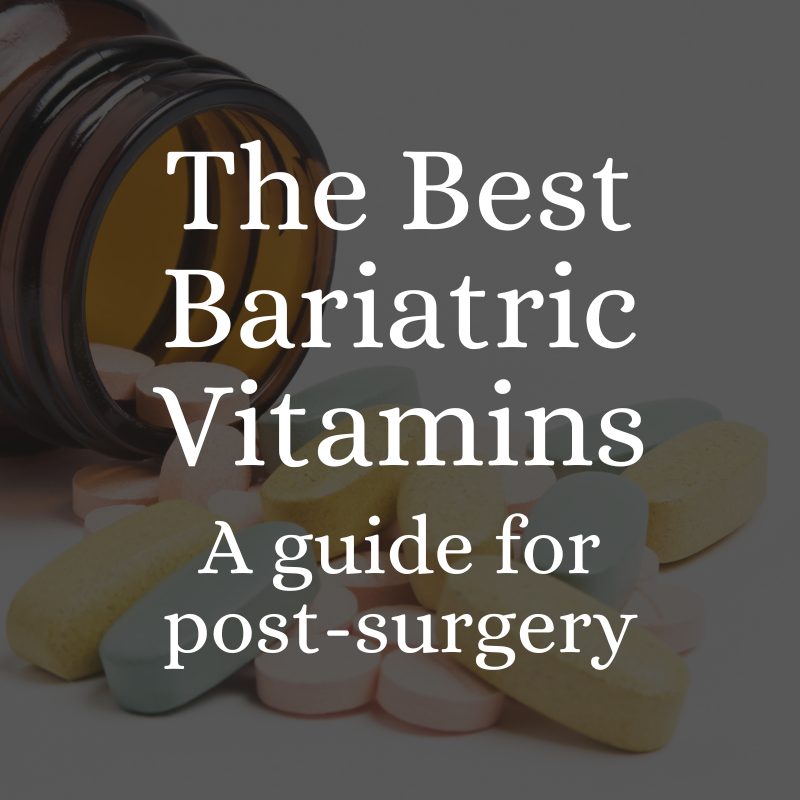Your cart is empty
Types Of Bariatric Protein Powders

Bariatric Protein Powders
Bariatric surgery is a life-changing procedure that helps individuals achieve significant weight loss by altering the digestive system. However, it also leads to a significant decrease in nutrient absorption, especially protein. This is where protein powders come in handy. They help bariatric patients meet their daily protein needs, which is crucial for maintaining muscle mass and supporting overall health.
Here we’ll explain the different types of protein powders, their pros and cons, and provide recommendations for bariatric patients based on individual needs and preferences.
Types of Bariatric Protein Powders
Whey Protein Powder
Definition and sources: Whey protein, one of the most common proteins used in bariatric protein shakes, is a byproduct of cheese production, derived from the liquid portion of milk that separates during the process. This protein-rich liquid is then filtered, concentrated, and dried to create whey protein powder. Available in various forms such as concentrate, isolate, and hydrolysate, whey protein is one of the most popular protein supplements for bariatric patients on the market due to its high biological value and easy digestibility.
Pros: One of the major benefits of whey protein is its high biological value, meaning it contains all nine essential amino acids that our bodies cannot produce on their own. Furthermore, it has a high proportion of branched-chain amino acids (BCAAs), which play a vital role in muscle growth and repair. Whey protein is easily and quickly absorbed by the body, making it an ideal choice for post-workout recovery when muscles require immediate nourishment. Additionally, some studies suggest that whey protein may help improve immune function, support weight loss by increasing satiety, and regulate blood sugar levels.
Cons: Despite its many benefits, whey protein may not be suitable for everyone. Those with lactose intolerance or milk allergies may experience digestive discomfort or allergic reactions due to the presence of lactose and milk proteins. Additionally, whey protein is not a vegan-friendly option, as it is derived from an animal source.
Casein Protein Powder
Definition and sources: Casein, another commonly used bariatric protein powder, is also a milk-derived protein that accounts for approximately 80% of the protein content in cow's milk. During the cheese-making process, casein coagulates and forms curds, while whey remains as a liquid. Casein protein powder is created by extracting the protein from these curds and then drying it. The two primary forms of casein protein powder available are micellar casein and casein hydrolysate.
Pros: One of the key advantages of casein protein for bariatric patients is its slow-release property. Unlike whey protein, casein forms a gel-like substance in the stomach, which takes longer to digest. This slow digestion rate results in a steady supply of amino acids to the muscles over an extended period, making it an ideal choice for nighttime use or between meals to help maintain muscle mass and prevent muscle breakdown. Additionally, casein protein can keep you feeling fuller for longer periods due to its slower digestion, potentially aiding in weight management.
Cons: Similar to whey protein, casein is not suitable for lactose intolerant individuals or vegans, as it is derived from milk. Its slower digestion rate, while advantageous in some situations, may not be ideal for those who require immediate protein absorption, such as during post-workout recovery.
Soy Protein Powder
Definition and sources: Soy protein powder is made from defatted soybean flakes that have been processed to remove most of the fat content. The remaining protein-rich flakes are then ground into a fine powder, providing a plant-based alternative to animal-derived proteins for bariatric patients. There are different types of soy protein powders, including soy protein isolate, soy protein concentrate, and textured soy protein.
Pros: Soy protein is a popular choice for bariatric vegans and vegetarians, as it is entirely plant-based. It is low in fat and contains all nine essential amino acids, making it a complete protein source. This quality sets it apart from many other plant-based protein options. Soy protein is also a good source of vitamins, minerals, and antioxidants, providing additional health benefits beyond just protein intake. Research has shown that soy protein may help lower cholesterol levels, support heart health, and aid in muscle recovery and growth.
Cons: While soy protein offers numerous benefits, it may not be the best choice for everyone. Some individuals may experience gastrointestinal discomfort, such as bloating or gas, when consuming soy protein. Moreover, soy contains phytoestrogens, plant compounds that can mimic the hormone estrogen. Although research on the effects of phytoestrogens is still inconclusive, some individuals may prefer to avoid soy protein due to potential hormonal impacts.
Pea Protein Powder
Definition and sources: Pea protein powder is derived from yellow split peas, providing another vegan-friendly bariatric protein powder option. This plant-based protein is extracted from the peas through a process that removes the starch and fiber, leaving a concentrated protein source.
Pros: Pea protein is easily digestible, making it an attractive option for bariatric patients who may experience digestive issues after weight loss surgery. It is also hypoallergenic, meaning it is less likely to cause allergic reactions and is a good choice for those with dietary restrictions or sensitivities. Additionally, protein can lower levels of ghrelin, the hormone responsible for stimulating feelings of hunger, which can be beneficial for weight loss. As a plant-based bariatric protein option, pea protein is suitable for vegans and vegetarians and has a lower environmental impact compared to animal-based protein sources.
Cons: One downside of pea protein is that it is not a complete protein, meaning it lacks some essential amino acids. However, this issue can be mitigated by combining pea protein with other plant-based proteins, such as rice protein, to create a complete amino acid profile. Pea protein may also be more expensive compared to other protein sources. Additionally, the taste and texture of pea protein powder might not appeal to everyone, so it's essential to consider personal preferences when choosing a protein source after weight loss surgery.
Rice Protein Powder
Definition and sources: Rice protein powder, typically made from brown rice, offers another plant-based bariatric protein powder option. Through a process that involves extracting the protein from the rice, the result is a concentrated protein source that can be used in protein shakes after weight loss surgery.
Pros: Similar to pea protein, rice protein is vegan-friendly, easily digestible, and hypoallergenic. This makes it a suitable option for bariatric patients with dietary restrictions, allergies, or sensitivities. Its digestibility is particularly important for those who have undergone weight loss surgery and may have difficulty digesting other protein sources. Rice protein also boasts a mild flavor and smooth texture, making it a versatile ingredient for bariatric protein powders and shakes. One lab study suggests that brown rice protein is better than white rice protein and soy protein for controlling weight gain.
Cons: Rice protein is not a complete protein, as it lacks some essential amino acids. However, this drawback can be addressed by combining rice protein with other plant-based protein sources, such as pea protein, to create a complete amino acid profile. Rice protein may also be more expensive compared to other protein sources, especially when searching for high-quality, organic, or non-GMO options.
Protein Powder Blends
In the world of protein powders, variety is key. This is where bariatric protein powder blends come into play. These blends combine different types of protein powders, such as whey, casein, soy, pea, and rice protein, to create a balanced and comprehensive protein source.
The benefits of protein powder blends for bariatric patients are manifold. They provide a complete amino acid profile. Each type of protein has its unique set of amino acids, and by combining them, you ensure that you're getting all the essential amino acids your body needs. This is particularly important for plant-based proteins like pea and rice, which on their own, lack certain essential amino acids.
Protein powder blends offer the advantage of both fast and slow-digesting proteins. Whey protein is quickly absorbed, making it ideal for post-workout recovery, while casein is slowly digested, providing a steady release of amino acids over time. Having both in your protein shake ensures that your muscles are continually nourished.
Bariatric protein powder blends offer a versatile and balanced approach to meeting your protein needs. They combine the best of different protein sources, ensuring a comprehensive nutrient profile, sustained release of amino acids, and compatibility with various dietary needs.

| Protein Type | Pros | Cons |
|---|---|---|
| Whey Protein |
|
|
| Casein Protein |
|
|
| Soy Protein |
|
|
| Pea Protein |
|
|
| Rice Protein |
|
|
Author: Allison Allison, a certified nutritionist and research author, brings over 15 years of experience in the health and weight loss industry. Allison's influence extends through her authorship of multiple health and wellness journals, where she shares her expertise and research on medical weight loss and bariatric medicine. |
Reviewed By: Dr. K. Huffman Dr. Kevin D. Huffman, D.O., is a board-certified bariatric physician renowned for his expertise in treating obesity. With over 10,000 patients and a reputation as a national leader in bariatric medicine, he has trained hundreds of healthcare providers. As the founder of American Bariatric Consultants, Dr. Huffman develops protocols and training materials sought after by medical societies, pharmaceutical companies, patients, and hospitals. |
Bariatric Guides & Information
More Info
- Choosing a selection results in a full page refresh.























